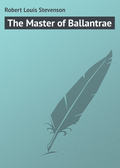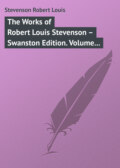
Роберт Льюис Стивенсон
Records of a Family of Engineers
It being impossible to open any of the hatches in the fore part of the ship in communicating with the deck, the watch was changed by passing through the several berths to the companion-stair leading to the quarter-deck. The writer, therefore, made the best of his way aft, and, on a second attempt to look out, he succeeded, and saw indeed an astonishing sight. The sea or waves appeared to be ten or fifteen feet in height of unbroken water, and every approaching billow seemed as if it would overwhelm our vessel, but she continued to rise upon the waves and to fall between the seas in a very wonderful manner. It seemed to be only those seas which caught her in the act of rising which struck her with so much violence and threw such quantities of water aft. On deck there was only one solitary individual looking out, to give the alarm in the event of the ship breaking from her moorings. The seaman on watch continued only two hours; he who kept watch at this time was a tall, slender man of a black complexion; he had no greatcoat nor over-all of any kind, but was simply dressed in his ordinary jacket and trousers; his hat was tied under his chin with a napkin, and he stood aft the foremast, to which he had lashed himself with a gasket or small rope round his waist, to prevent his falling upon deck or being washed overboard. When the writer looked up, he appeared to smile, which afforded a further symptom of the confidence of the crew in their ship. This person on watch was as completely wetted as if he had been drawn through the sea, which was given as a reason for his not putting on a greatcoat, that he might wet as few of his clothes as possible, and have a dry shift when he went below. Upon deck everything that was movable was out of sight, having either been stowed below, previous to the gale, or been washed overboard. Some trifling parts of the quarter boards were damaged by the breach of the sea; and one of the boats upon deck was about one-third full of water, the oyle-hole or drain having been accidently stopped up, and part of her gunwale had received considerable injury. These observations were hastily made, and not without occasionally shutting the companion, to avoid being wetted by the successive seas which broke over the bows and fell upon different parts of the deck according to the impetus with which the waves struck the vessel. By this time it was about three o’clock in the afternoon, and the gale, which had now continued with unabated force for twenty-seven hours, had not the least appearance of going off.
In the dismal prospect of undergoing another night like the last, and being in imminent hazard of parting from our cable, the writer thought it necessary to advise with the master and officers of the ship as to the probable event of the vessel’s drifting from her moorings. They severally gave it as their opinion that we had now every chance of riding out the gale, which, in all probability, could not continue with the same fury many hours longer; and that even if she should part from her anchor, the storm-sails had been laid to hand, and could be bent in a very short time. They further stated that from the direction of the wind being N.E., she would sail up the Firth of Forth to Leith Roads. But if this should appear doubtful, after passing the Island and Light of May, it might be advisable at once to steer for Tyningham Sands, on the western side of Dunbar, and there run the vessel ashore. If this should happen at the time of high-water, or during the ebbing of the tide, they were of opinion, from the flatness and strength of the floating light, that no danger would attend her taking the ground, even with a very heavy sea. The writer, seeing the confidence which these gentlemen possessed with regard to the situation of things, found himself as much relieved with this conversation as he had previously been with the seeming indifference of the forecastle men, and the smile of the watch upon deck, though literally lashed to the foremast. From this time he felt himself almost perfectly at ease; at any rate, he was entirely resigned to the ultimate result.
About six o’clock in the evening the ship’s company was heard moving upon deck, which on the present occasion was rather the cause of alarm. The writer accordingly rang his bell to know what was the matter, when he was informed by the steward that the weather looked considerably better, and that the men upon deck were endeavouring to ship the smoke-funnel of the galley that the people might get some meat. This was a more favourable account than had been anticipated. During the last twenty-one hours he himself had not only had nothing to eat, but he had almost never passed a thought on the subject. Upon the mention of a change of weather, he sent the steward to learn how the artificers felt, and on his return he stated that they now seemed to be all very happy, since the cook had begun to light the galley-fire and make preparations for the suet-pudding of Sunday, which was the only dish to be attempted for the mess, from the ease with which it could both be cooked and served up.
The principal change felt upon the ship as the wind abated was her increased rolling motion, but the pitching was much diminished, and now hardly any sea came farther aft than the foremast: but she rolled so extremely hard as frequently to dip and take in water over the gunwales and rails in the waist. By nine o’clock all hands had been refreshed by the exertions of the cook and steward, and were happy in the prospect of the worst of the gale being over. The usual complement of men was also now set on watch, and more quietness was experienced throughout the ship. Although the previous night had been a very restless one, it had not the effect of inducing repose in the writer’s berth on the succeeding night; for having been so much tossed about in bed during the last thirty hours, he found no easy spot to turn to, and his body was all sore to the touch, which ill accorded with the unyielding materials with which his bed-place was surrounded.
[Monday, 7th Sept.]
This morning, about eight o’clock, the writer was agreeably surprised to see the scuttle of his cabin sky-light removed, and the bright rays of the sun admitted. Although the ship continued to roll excessively, and the sea was still running very high, yet the ordinary business on board seemed to be going forward on deck. It was impossible to steady a telescope, so as to look minutely at the progress of the waves and trace their breach upon the Bell Rock; but the height to which the cross-running waves rose in sprays when they met each other was truly grand, and the continued roar and noise of the sea was very perceptible to the ear. To estimate the height of the sprays at forty or fifty feet would surely be within the mark. Those of the workmen who were not much afflicted with sea-sickness, came upon deck, and the wetness below being dried up, the cabins were again brought into a habitable state. Every one seemed to meet as if after a long absence, congratulating his neighbour upon the return of good weather. Little could be said as to the comfort of the vessel, but after riding out such a gale, no one felt the least doubt or hesitation as to the safety and good condition of her moorings. The master and mate were extremely anxious, however, to heave in the hempen cable, and see the state of the clinch or iron ring of the chain-cable. But the vessel rolled at such a rate that the seamen could not possibly keep their feet at the windlass nor work the hand-spikes, though it had been several times attempted since the gale took off.
About twelve noon, however, the vessel’s motion was observed to be considerably less, and the sailors were enabled to walk upon deck with some degree of freedom. But, to the astonishment of every one, it was soon discovered that the floating light was adrift! The windlass was instantly manned, and the men soon gave out that there was no strain upon the cable. The mizzen sail, which was bent for the occasional purpose of making the vessel ride more easily to the tide, was immediately set, and the other sails were also hoisted in a short time, when, in no small consternation, we bore away about one mile to the south-westward of the former station, and there let go the best bower anchor and cable in twenty fathoms water, to ride until the swell of the sea should fall, when it might be practicable to grapple for the moorings, and find a better anchorage for the ship.
[Tuesday, 15th Sept.]
This morning, at five a.m., the bell rung as a signal for landing upon the rock, a sound which, after a lapse of ten days, it is believed was welcomed by every one on board. There being a heavy breach of sea at the eastern creek, we landed, though not without difficulty, on the western side, every one seeming more eager than another to get upon the rock; and never did hungry men sit down to a hearty meal with more appetite than the artificers began to pick the dulse from the rocks. This marine plant had the effect of reviving the sickly, and seemed to be no less relished by those who were more hardy.
While the water was ebbing, and the men were roaming in quest of their favourite morsel, the writer was examining the effects of the storm upon the forge and loose apparatus left upon the rock. Six large blocks of granite which had been landed, by way of experiment, on the 1st instant, were now removed from their places and, by the force of the sea, thrown over a rising ledge into a hole at the distance of twelve or fifteen paces from the place on which they had been landed. This was a pretty good evidence both of the violence of the storm and the agitation of the sea upon the rock. The safety of the smith’s forge was always an object of essential regard. The ash-pan of the hearth or fireplace, with its weighty cast-iron back, had been washed from their places of supposed security; the chains of attachment had been broken, and these ponderous articles were found at a very considerable distance in a hole on the western side of the rock; while the tools and picks of the Aberdeen masons were scattered about in every direction. It is, however, remarkable that not a single article was ultimately lost.
This being the night on which the floating light was advertised to be lighted, it was accordingly exhibited, to the great joy of every one.
[Wednesday, 16th Sept.]
The writer was made happy to-day by the return of the Lighthouse yacht from a voyage to the Northern Lighthouses. Having immediately removed on board of this fine vessel of eighty-one tons register, the artificers gladly followed; for, though they found themselves more pinched for accommodation on board of the yacht, and still more so in the Smeaton, yet they greatly preferred either of these to the Pharos, or floating light, on account of her rolling motion, though in all respects fitted up for their conveniency.
The writer called them to the quarter-deck and informed them that, having been one mouth afloat, in terms of their agreement they were now at liberty to return to the workyard at Arbroath if they preferred this to continuing at the Bell Rock. But they replied that, in the prospect of soon getting the beacon erected upon the rock, and having made a change from the floating light, they were now perfectly reconciled to their situation, and would remain afloat till the end of the working season.
[Thursday, 17th Sept.]
The wind was at N.E. this morning, and though they were only light airs, yet there was a pretty heavy swell coming ashore upon the rock. The boats landed at half-past seven o’clock a.m., at the creek on the southern side of the rock, marked Port Hamilton. But as one of the boats was in the act of entering this creek, the seaman at the bow-oar, who had just entered the service, having inadvertently expressed some fear from a heavy sea which came rolling towards the boat, and one of the artificers having at the same time looked round and missed a stroke with his oar, such a preponderance was thus given to the rowers upon the opposite side that when the wave struck the boat it threw her upon a ledge of shelving rocks, where the water left her, and she having kanted to seaward, the next wave completely filled her with water. After making considerable efforts the boat was again got afloat in the proper track of the creek, so that we landed without any other accident than a complete ducking. There being no possibility of getting a shift of clothes, the artificers began with all speed to work, so as to bring themselves into heat, while the writer and his assistants kept as much as possible in motion. Having remained more than an hour upon the rock, the boats left it at half-past nine; and, after getting on board, the writer recommended to the artificers, as the best mode of getting into a state of comfort, to strip off their wet clothes and go to bed for an hour or two. No further inconveniency was felt, and no one seemed to complain of the affection called ‘catching cold.’
[Friday, 18th Sept.]
An important occurrence connected with the operations of this season was the arrival of the Smeaton at four p.m., having in tow the six principal beams of the beacon-house, together with all the stanchions and other work on board for fixing it on the rock. The mooring of the floating light was a great point gained, but in the erection of the beacon at this late period of the season new difficulties presented themselves. The success of such an undertaking at any season was precarious, because a single day of bad weather occurring before the necessary fixtures could be made might sweep the whole apparatus from the rock. Notwithstanding these difficulties, the writer had determined to make the trial, although he could almost have wished, upon looking at the state of the clouds and the direction of the wind, that the apparatus for the beacon had been still in the workyard.
[Saturday, 19th Sept.]
The main beams of the beacon were made up in two separate rafts, fixed with bars and bolts of iron. One of these rafts, not being immediately wanted, was left astern of the floating light, and the other was kept in tow by the Smeaton, at the buoy nearest to the rock. The Lighthouse yacht rode at another buoy with all hands on board that could possibly be spared out of the floating light. The party of artificers and seamen which landed on the rock counted altogether forty in number. At half-past eight o’clock a derrick, or mast of thirty feet in height, was erected and properly supported with guy-ropes, for suspending the block for raising the first principal beam of the beacon; and a winch machine was also bolted down to the rock for working the purchase-tackle.
Upon raising the derrick, all hands on the rock spontaneously gave three hearty cheers, as a favourable omen of our future exertions in pointing out more permanently the position of the rock. Even to this single spar of timber, could it be preserved, a drowning man might lay hold. When the Smeaton drifted on the 2nd of this month such a spar would have been sufficient to save us till she could have come to our relief.
[Sunday, 20th Sept.]
The wind this morning was variable, but the weather continued extremely favourable for the operations throughout the whole day. At six a.m. the boats were in motion, and the raft, consisting of four of the six principal beams of the beacon-house, each measuring about sixteen inches square, and fifty feet in length, was towed to the rock, where it was anchored, that it might ground upon it as the water ebbed. The sailors and artificers, including all hands, to-day counted no fewer than fifty-two, being perhaps the greatest number of persons ever collected upon the Bell Rock. It was early in the tide when the boats reached the rock, and the men worked a considerable time up to their middle in water, every one being more eager than his neighbour to be useful. Even the four artificers who had hitherto declined working on Sunday were to-day most zealous in their exertions. They had indeed become so convinced of the precarious nature and necessity of the work that they never afterwards absented themselves from the rock on Sunday when a landing was practicable.
Having made fast a piece of very good new line, at about two-thirds from the lower end of one of the beams, the purchase-tackle of the derrick was hooked into the turns of the line, and it was speedily raised by the number of men on the rock and the power of the winch tackle. When this log was lifted to a sufficient height, its foot, or lower end, was stepped into the spot which had been previously prepared for it. Two of the great iron stanchions were then set in their respective holes on each side of the beam, when a rope was passed round them and the beam, to prevent it from slipping till it could be more permanently fixed. The derrick, or upright spar used for carrying the tackle to raise the first beam, was placed in such a position as to become useful for supporting the upper end of it, which now became, in its turn, the prop of the tackle for raising the second beam. The whole difficulty of this operation was in the raising and propping of the first beam, which became a convenient derrick for raising the second, these again a pair of shears for lifting the third, and the shears a triangle for raising the fourth. Having thus got four of the six principal beams set on end, it required a considerable degree of trouble to get their upper ends to fit. Here they formed the apex of a cone, and were all together mortised into a large piece of beechwood, and secured, for the present, with ropes, in a temporary manner. During the short period of one tide all that could further be done for their security was to put a single screw-bolt through the great kneed bats or stanchions on each side of the beams, and screw the nut home.
In this manner these four principal beams were erected, and left in a pretty secure state. The men had commenced while there was about two or three feet of water upon the side of the beacon, and as the sea was smooth they continued the work equally long during flood-tide. Two of the boats being left at the rock to take off the joiners, who were busily employed on the upper parts till two o’clock p.m., this tide’s work may be said to have continued for about seven hours, which was the longest that had hitherto been got upon the rock by at least three hours.
When the first boats left the rock with the artificers employed on the lower part of the work during the flood-tide, the beacon had quite a novel appearance. The beams erected formed a common base of about thirty-three feet, meeting at the top, which was about forty-five feet above the rock, and here half a dozen of the artificers were still at work. After clearing the rock the boats made a stop, when three hearty cheers were given, which were returned with equal goodwill by those upon the beacon, from the personal interest which every one felt in the prosperity of this work, so intimately connected with his safety.
All hands having returned to their respective ships, they got a shift of dry clothes and some refreshment. Being Sunday, they were afterwards convened by signal on board of the Lighthouse yacht, when prayers were read; for every heart upon this occasion felt gladness, and every mind was disposed to be thankful for the happy and successful termination of the operations of this day.
[Monday, 21st Sept.]
The remaining two principal beams were erected in the course of this tide, which, with the assistance of those set up yesterday, was found to be a very simple operation.
The six principal beams of the beacon were thus secured, at least in a temporary manner, in the course of two tides, or in the short space of about eleven hours and a half. Such is the progress that may be made when active hands and willing minds set properly to work in operations of this kind.
[Tuesday 22nd, Sept.]
Having now got the weighty part of this work over, and being thereby relieved of the difficulty both of landing and victualling such a number of men, the Smeaton could now be spared, and she was accordingly despatched to Arbroath for a supply of water and provisions, and carried with her six of the artificers who could best be spared.
[Wednesday, 23rd Sept.]
In going out of the eastern harbour, the boat which the writer steered shipped a sea, that filled her about one-third with water. She had also been hid for a short time, by the waves breaking upon the rock, from the sight of the crew of the preceding boat, who were much alarmed for our safety, imagining for a time that she had gone down.
The Smeaton returned from Arbroath this afternoon, but there was so much sea that she could not be made fast to her moorings, and the vessel was obliged to return to Arbroath without being able either to deliver the provisions or take the artificers on board. The Lighthouse yacht was also soon obliged to follow her example, as the sea was breaking heavily over her bows. After getting two reefs in the mainsail, and the third or storm-jib set, the wind being S.W., she bent to windward, though blowing a hard gale, and got into St. Andrews Bay, where we passed the night under the lee of Fifeness.
[Thursday, 24th Sept.]
At two o’clock this morning we were in St. Andrews Bay, standing off and on shore, with strong gales of wind at S.W.; at seven we were off the entrance of the Tay; at eight stood towards the rock, and at ten passed to leeward of it, but could not attempt a landing. The beacon, however, appeared to remain in good order, and by six p.m. the vessel had again beaten up to St. Andrews Bay, and got into somewhat smoother water for the night.
[Friday, 25th Sept.]
At seven o’clock bore away for the Bell Rock, but finding a heavy sea running on it were unable to land. The writer, however, had the satisfaction to observe, with his telescope, that everything about the beacon appeared entire: and although the sea had a most frightful appearance, yet it was the opinion of every one that, since the erection of the beacon, the Bell Rock was divested of many of its terrors, and had it been possible to have got the boats hoisted out and manned, it might have even been found practicable to land. At six it blew so hard that it was found necessary to strike the topmast and take in a third reef of the mainsail, and under this low canvas we soon reached St. Andrews Bay, and got again under the lee of the land for the night. The artificers, being sea-hardy, were quite reconciled to their quarters on board of the Lighthouse yacht; but it is believed that hardly any consideration would have induced them again to take up their abode in the floating light.
[Saturday, 26th Sept.]
At daylight the yacht steered towards the Bell Rock, and at eight a.m. made fast to her moorings; at ten, all hands, to the amount of thirty, landed, when the writer had the happiness to find that the beacon had withstood the violence of the gale and the heavy breach of sea, everything being found in the same state in which it had been left on the 21st. The artificers were now enabled to work upon the rock throughout the whole day, both at low and high water, but it required the strictest attention to the state of the weather, in case of their being overtaken with a gale, which might prevent the possibility of getting them off the rock.
Two somewhat memorable circumstances in the annals of the Bell Rock attended the operations of this day: one was the removal of Mr. James Dove, the foreman smith, with his apparatus, from the rock to the upper part of the beacon, where the forge was now erected on a temporary platform, laid on the cross beams or upper framing. The other was the artificers having dined for the first time upon the rock, their dinner being cooked on board of the yacht, and sent to them by one of the boats. But what afforded the greatest happiness and relief was the removal of the large bellows, which had all along been a source of much trouble and perplexity, by their hampering and incommoding the boat which carried the smiths and their apparatus.
[Saturday, 3rd Oct.]
The wind being west to-day, the weather was very favourable for operations at the rock, and during the morning and evening tides, with the aid of torchlight, the masons had seven hours’ work upon the site of the building. The smiths and joiners, who landed at half-past six a.m., did not leave the rock till a quarter-past eleven p.m., having been at work, with little intermission, for sixteen hours and three-quarters. When the water left the rock, they were employed at the lower parts of the beacon, and as the tide rose or fell, they shifted the place of their operations. From these exertions, the fixing and securing of the beacon made rapid advancement, as the men were now landed in the morning and remained throughout the day. But, as a sudden change of weather might have prevented their being taken off at the proper time of tide, a quantity of bread and water was always kept on the beacon.
During this period of working at the beacon all the day, and often a great part of the night, the writer was much on board of the tender; but, while the masons could work on the rock, and frequently also while it was covered by the tide, he remained on the beacon; especially during the night, as he made a point of being on the rock to the latest hour, and was generally the last person who stepped into the boat. He had laid this down as part of his plan of procedure; and in this way had acquired, in the course of the first season, a pretty complete knowledge and experience of what could actually be done at the Bell Rock, under all circumstances of the weather. By this means also his assistants, and the artificers and mariners, got into a systematic habit of proceeding at the commencement of the work, which, it is believed, continued throughout the whole of the operations.
[Sunday, 4th Oct.]
The external part of the beacon was now finished, with its supports and bracing-chains, and whatever else was considered necessary for its stability in so far as the season would permit; and although much was still wanting to complete this fabric, yet it was in such a state that it could be left without much fear of the consequences of a storm. The painting of the upper part was nearly finished this afternoon; and the Smeaton had brought off a quantity of brushwood and other articles, for the purpose of heating or charring the lower part of the principal beams, before being laid over with successive coats of boiling pitch, to the height of from eight to twelve feet, or as high as the rise of spring-tides. A small flagstaff having also been erected to-day, a flag was displayed for the first time from the beacon, by which its perspective effect was greatly improved. On this, as on all like occasions at the Bell Rock, three hearty cheers were given; and the steward served out a dram of rum to all hands, while the Lighthouse yacht, Smeaton, and floating light, hoisted their colours in compliment to the erection.
[Monday, 5th Oct.]
In the afternoon, and just as the tide’s work was over, Mr. John Rennie, engineer, accompanied by his son Mr. George, on their way to the harbour works of Fraserburgh, in Aberdeenshire, paid a visit to the Bell Rock, in a boat from Arbroath. It being then too late in the tide for landing, they remained on board of the Lighthouse yacht all night, when the writer, who had now been secluded from society for several weeks, enjoyed much of Mr. Rennie’s interesting conversation, both on general topics, and professionally upon the progress of the Bell Rock works, on which he was consulted as chief engineer.
[Tuesday, 6th Oct.]
The artificers landed this morning at nine, after which one of the boats returned to the ship for the writer and Messrs. Rennie, who, upon landing, were saluted with a display of the colours from the beacon and by three cheers from the workmen. Everything was now in a prepared state for leaving the rock, and giving up the works afloat for this season, excepting some small articles, which would still occupy the smiths and joiners for a few days longer. They accordingly shifted on board of the Smeaton, while the yacht left the rock for Arbroath, with Messrs. Rennie, the writer, and the remainder of the artificers. But, before taking leave, the steward served out a farewell glass, when three hearty cheers were given, and an earnest wish expressed that everything, in the spring of 1808, might be found in the same state of good order as it was now about to be left.







